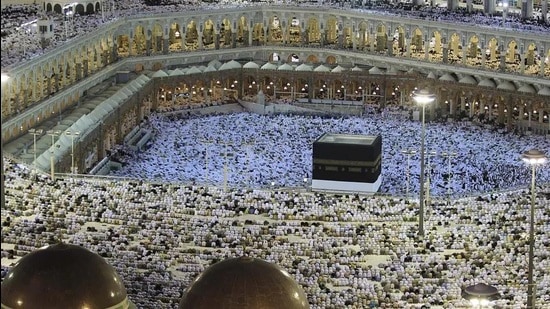In a significant development aimed at facilitating the Umrah pilgrimage for Indian Muslims, Saudi Arabia has recently revised its visa regulations, ushering in a new era for those seeking to embark on this sacred journey.

Source: Hindustan Times
The revision of visa regulations not only opens the door for more Indian Muslims to perform Umrah but also marks a progressive step toward simplifying the pilgrimage process. A notable change includes the elimination of restrictions based on the pilgrim’s previous visa status, allowing them to partake in Umrah seamlessly. Furthermore, Saudi Arabia has introduced a user-friendly e-visa system, making the application process smoother and more efficient for Indian pilgrims.
The revised regulations allow Indian pilgrims to perform Umrah without the need for a special visa, paving the way for them to undertake the pilgrimage using either a tourism or work visa. This move is anticipated to benefit a growing number of Indian Muslims, with around 1.37 million expected to partake in Umrah in 2024.

Source: Outlook India
To accommodate the anticipated surge in pilgrims, Saudi Arabia has taken several measures to streamline the journey for Indian travelers. One key initiative is the increase in the number of direct flights from various Indian airports to Jeddah and Madinah. This strategic move aims to enhance accessibility and reduce travel hassles for pilgrims, ensuring a more straightforward and convenient journey.
In addition to boosting the frequency of flights between the two nations, Saudi Arabia has also negotiated agreements to augment the number of dedicated flights from India. The Saudi Hajj and Umrah minister, Tawfig Bin Fawzan Al-Rabiah, highlighted these efforts during his visit to India. The focus on enhancing seat capacity on Saudi Airlines further underscores the commitment to meeting the rising demand for Umrah pilgrimage among Indian Muslims.

Source: India Today
A significant aspect of the revised regulations is the extension of the Umrah visa duration to 90 days, providing pilgrims with increased flexibility during their sacred journey. The introduction of a stopover visa option is another noteworthy adaptation, allowing Indians planning to perform Umrah to make the most of their journey. These measures not only ease the logistical aspects of the pilgrimage but also cater to the diverse needs of Indian pilgrims, fostering a more inclusive and accommodating environment.
Moreover, the recent visit of Tawfig Bin Fawzan Al-Rabiah to India was not solely focused on visa regulations. During his time in the country, he took a moment to acknowledge and appreciate the valuable contributions of Indian expatriates to the economic and cultural enrichment of Saudi Arabia. This recognition underscores the strong ties between the two nations and highlights the reciprocal relationship that extends beyond pilgrimage-related matters.





















































































